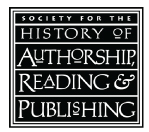Eva Mroczek
Election
Position
Name
Eva Mroczek
Candidate statement
Eva Mroczek. Associate Professor in the Department of Religious Studies and the Jewish Studies Program at the University of California, Davis.
My introduction to the field came through the Book History and Print Culture Program at the University of Toronto, where I completed my PhD in the Study of Religion and Jewish Studies in 2012. My first article, “Thinking Digitally About the Dead Sea Scrolls: ‘Book History’ Before and Beyond the Book,” was in Book History in 2011. I showed that a comparative perspective on written material before and after the dominance of print can help destabilize the print-centered categories that distort our understanding of both manuscript and digital cultures. I have also reviewed manuscripts for Book History and have just begun a term on the editorial board. My first book, The Literary Imagination in Jewish Antiquity (Oxford, 2016), brings the questions of Book History to bear on the manuscript and scroll-based culture of early Judaism, and was awarded SHARP’s De Long Prize in 2017. My next book, Out of the Cave: Manuscript Discovery and the Possibility of a New Biblical Past, discusses the phenomenon of manuscript discovery stories as a literary and religious genre, considering the legacy of colonialism and racism in modern access to ancient sources. Beyond my own research, I have worked to make connections between biblical studies (and antiquity more broadly), Jewish Studies, and Book History. In 2013, I founded the “Book History and Biblical Literatures” program unit at the Society of Biblical Literature, and I am glad to witness some of the early career scholars who have presented there becoming involved with SHARP, bringing ancient texts into conversation with the more established currents in Book History. I have just passed the baton to a new program unit chair, and I now hope to broaden my work of forging links between the study of ancient and modern textual cultures in the context of SHARP. My goals would include creating spaces within SHARP for scholars of antiquity, who can help rethink the longue durée history of the book in conversation with scholars of print and digital texts, and fostering more collaboration with scholars of the Jewish book.
My introduction to the field came through the Book History and Print Culture Program at the University of Toronto, where I completed my PhD in the Study of Religion and Jewish Studies in 2012. My first article, “Thinking Digitally About the Dead Sea Scrolls: ‘Book History’ Before and Beyond the Book,” was in Book History in 2011. I showed that a comparative perspective on written material before and after the dominance of print can help destabilize the print-centered categories that distort our understanding of both manuscript and digital cultures. I have also reviewed manuscripts for Book History and have just begun a term on the editorial board. My first book, The Literary Imagination in Jewish Antiquity (Oxford, 2016), brings the questions of Book History to bear on the manuscript and scroll-based culture of early Judaism, and was awarded SHARP’s De Long Prize in 2017. My next book, Out of the Cave: Manuscript Discovery and the Possibility of a New Biblical Past, discusses the phenomenon of manuscript discovery stories as a literary and religious genre, considering the legacy of colonialism and racism in modern access to ancient sources. Beyond my own research, I have worked to make connections between biblical studies (and antiquity more broadly), Jewish Studies, and Book History. In 2013, I founded the “Book History and Biblical Literatures” program unit at the Society of Biblical Literature, and I am glad to witness some of the early career scholars who have presented there becoming involved with SHARP, bringing ancient texts into conversation with the more established currents in Book History. I have just passed the baton to a new program unit chair, and I now hope to broaden my work of forging links between the study of ancient and modern textual cultures in the context of SHARP. My goals would include creating spaces within SHARP for scholars of antiquity, who can help rethink the longue durée history of the book in conversation with scholars of print and digital texts, and fostering more collaboration with scholars of the Jewish book.
